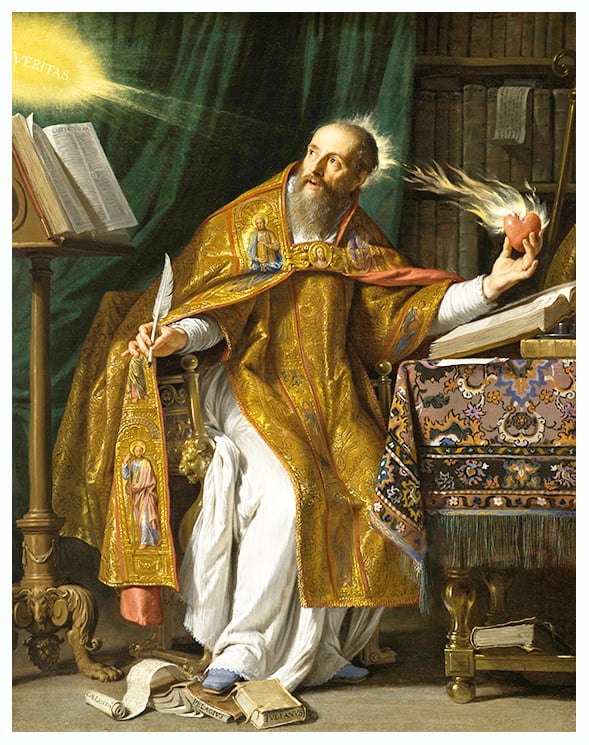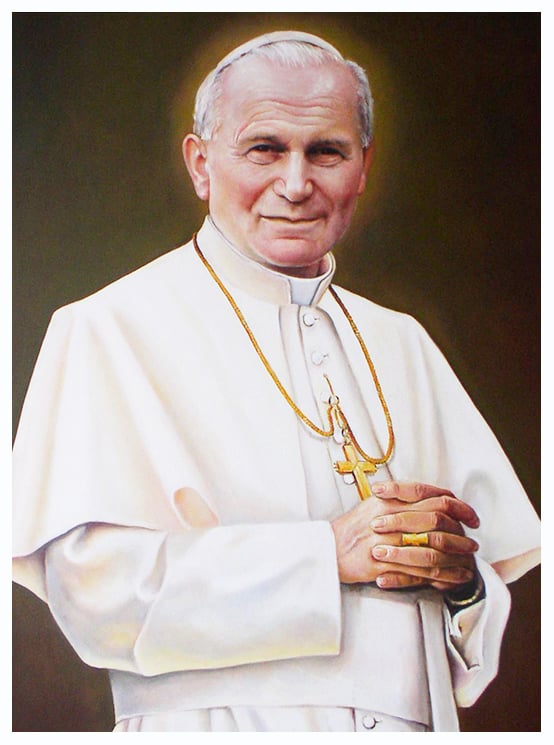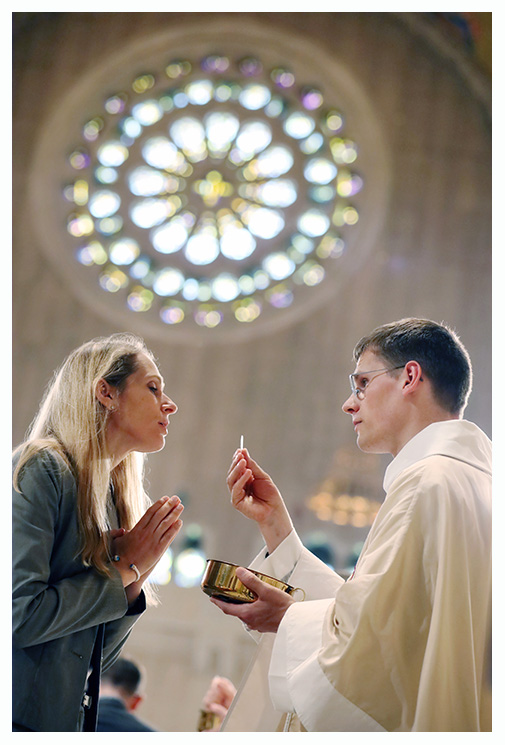
Therefore we also will serve the Lord, for He is our God
This reflection based on the readings for this Sunday, the Twenty First Sunday in Ordinary Time, Year B: Joshua 24, 1-2a, 15-17, 18b; Psalm 34; Ephesians 4:32-5:1-2, 21-32; and John 5:53, 60-69.
This Sunday, after six weeks of reading it at the Sunday Masses, we conclude the Bread of Life discourse from the Gospel of John. As it comes to a close, we hear the reaction of those who have heard Jesus say: “Very truly, I tell you, unless you eat of the flesh of the Son of Man and drink his blood, you have no life in you.” For many of Jesus’ contemporary listeners, the idea of eating His flesh and drinking His blood is incomprehensible and they reject the idea completely. And yet, while in many other cases when He is misunderstood, He explains himself more clearly, on this matter Jesus does not back away from his insistence that those who wish to have eternal life must consume His Body and drink His Blood. Unable to accept this idea, many of His followers state that it is a teaching that it is difficult to accept. We are told at this point, that many of Jesus’ followers turned away and no longer followed Him. When He asks the twelve if they also wish to leave, they do not indicate that they understand, they simply state that they have nowhere else to go because in faith they affirm that He has the words of eternal life and they have “come to believe and know that [Jesus] is the Holy one of God.”

One of the great mysteries of our Catholic faith is the Eucharist. We believe that Jesus gives us His Body and Blood in the sacrament of the Eucharist. Through “transubstantiation,” we believe that in the Eucharistic Prayer, the Holy Spirit comes down on the bread and wine and turns them into Christ’s Body and Blood so that we might receive Him in the Eucharist and the promise that He makes to be with us, and to bring us to eternal life, may be fulfilled. Although this is a mystery of faith that is difficult to comprehend, one of the reasons that most of us accept it has to do with the Bread of Life Discourse that we have heard read in the Sunday Gospels these past six Sundays. Here, again and again, Jesus tells us, and His disciples, that He will give us His Body and Blood so that we might share eternal life with Him. When doubt is expressed by those who hear him, Jesus emphasizes the essential quality of this teaching by indicating that it is not optional. It is at the heart of our faith. As He repeats again today, “Unless you eat the flesh of the Son of Man and drink His blood, you have no life in you.” What I have often found difficult to understand in some of the Fundamental Protestant theologies is how they can insist that everything in the Scriptures must be taken literally, and yet this is the one chapter that they exclude from that approach to Scripture. Here, they claim, that Jesus did not mean what He repeatedly says about eating His flesh and drinking His blood. And yet, throughout this whole sixth chapter of John’s Gospel, Jesus has repeated over and over again that it is the one thing that is essential for eternal life.
Because I think that it is safe to say that most Catholics who attend Mass do accept that the Eucharist they receive is the Body and Blood of Christ, I would like to focus on another aspect of the theology of the Eucharist that I think is also very difficult for people to accept and believe these days.
I said that I believe that most people who receive the Eucharist do believe that it is the Body of Christ. The reason that I say this is because when we receive the Eucharist, the minister who is distributing the Eucharist holds it up and says: “The Body of Christ.” As we respond “Amen,” we are in fact saying, “I believe.” However, what I think many of us fail to understand when we receive the Eucharist is what we are called to be because we have received Christ’s Body and Blood. St. Augustine, as I have often recounted, when he distributed the Eucharist, would hold it up and say: “Christian, receive what you are to become, the Body of Christ.” Because we have received Christ’s Body, we ourselves are to become Christ’s Body. The gift of the Eucharist is given to us, that we might become the Body of Christ—living members of the Church on earth. As we receive Christ’s body, He comes to dwell in us so that we might continue His work on earth today as members of His Church.

Several years ago, in a commentary on the Mass, based upon the story of the Disciples on the Road to Emmaus, entitled Remain with us Lord, Pope St. John Paul II spoke about what ought to happen to us at each Eucharistic celebration. He spoke of the Mass as bringing us to encounter, communion and mission. I would like to say just a little about each of these three points today.
When you and I gather at Mass, we are invited to an encounter with the Lord. We come to hear Him speak to us in His word. We receive Him in the Sacrament of the Eucharist. Mass is an encounter with the Lord and His Church.
When we receive the Eucharist, we are established in communion with the Holy Trinity. Because we consume Christ’s Body, He dwells in us. By the power of the Holy Spirit, we are each united in the Eucharist with the three persons of the Holy Trinity. However, we are not just united to God. The Eucharist establishes us in communion with one another and the Church. At Mass, we pray that our sacrifice might be united with the Church on earth and Heaven as it is offered in union with Francis our Pope and Francis our bishop. We also are united with Mary, the saints in Heaven and all those Christians who have gone before us. One of the beautiful names for the Eucharist is “Communion,” and this is because of the communion that is established with God and the other members of the Church as we receive Christ’s Body within us. How differently we all might treat one another if we all really believed and understood that we are brothers and sisters united in Christ.
The final aspect of receiving the Eucharist is the mission that we are given when we receive it. As Christ comes to dwell in us, we are sent to make Him present to others. For many people, I think that they believe Christ gives them the gift of His Body and Blood to keep them safe. They think that when Christ is with them, nothing bad can happen. However, that is not why receive the Eucharist. Jesus gives us His Body and Blood to strengthen us to live the mission that He has called us to live as members of His Body the Church on earth. As we receive His Body and Blood, we are called to take Him with us and be His witnesses. Receiving the Eucharist is like receiving the mission to make Christ present in our lives. This is the part of the teaching that we hear today that I think many today wish to reject and turn away from.

We hear in our first reading this Sunday, from the Book of the Prophet Joshua, how after the people recounted all that God had done for them, they decided that they would serve Him. It was as though once they considered all that God had done for them, they understood that they were bound and obliged out of thanksgiving to serve Him. They respond to the marvels that God has done for them by saying: “far be it from us that we should forsake the Lord to serve other gods; for it was the Lord our God who brought us and our ancestors up from the land of Egypt, out of the house of slavery, and who did those great signs in our sight. He protected us along the way that we went, and among all the peoples through whom we passed. Therefore, we also will serve the Lord, for he is our God.” When we come to the Eucharist, and receive the Body of Christ, you and I are invited to recall all that Christ did for us in His life, death and resurrection, and giving thanks for this, we are invited to serve Him. The word “Eucharist” itself means thanksgiving. We are invited to respond to the gift of eternal life that He has won for us by serving Him as members of His Body the Church.
In the coming month, as we begin a new school year, I would like to invite you to consider what it means for you, in your circumstances, to be a member of Christ’s Body. There will be various ministry workshops taking place in the parish in the month ahead, and as we approach Stewardship Sunday in September, please consider getting involved in your community. Is this teaching about the Church one that you can accept or is it too good or difficult to believe? I think that if you have the same faith that the apostles had, and believe that Jesus truly does have the words that lead to eternal life, you will embrace your call to serve in the Church like the early disciples who heard Christ, because you to know that Jesus is the Holy one of God. If you find yourself holding back in your response, then do as I do, and make your own the words of another apostle who could not fathom the generosity of the God who placed him in the presence of the Risen Lord and said: “Lord I believe, help my unbelief” (The words of the Apostle Thomas when he accepted that Jesus was truly risen).
As we receive the Eucharist this Sunday, may we who receive Christ in this great sacrament, also understand that we are called to be Christ to those whom we are sent.
Fr. Michael McGourty is Pastor of St. Peter’s Church in downtown Toronto.
